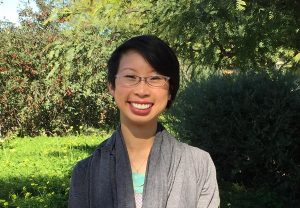by Nicole Sazegar
Staff Writer, The Daily Aztec
February 3, 2016
 Professor Jillian Wiggins never meant to start studying psychology as an undergrad, but her involvement in clinical science and research in brain imaging makes her a perfect fit as a new professor in the department of psychology at San Diego State.
Professor Jillian Wiggins never meant to start studying psychology as an undergrad, but her involvement in clinical science and research in brain imaging makes her a perfect fit as a new professor in the department of psychology at San Diego State.
While working at SDSU, Wiggins has the opportunity to create her research program and further her research by scanning children in the MRI.
She is also looking for students who want to be research assistants. The position requires helping run children through the MRI, working with families, helping kids fill out questionnaires, and managing data for two semesters.
Wiggins received her bachelor’s degree from Wheaton College, her master’s degree from Texas A& M University, and, eventually, her Ph.D. from the University of Michigan.
While at Michigan, Wiggins started researching children who have autism. After she graduated, she started her research at the National Institute of Health, a biomedical research facility, to work with kids who have a variety of disorders.
“I came (to SDSU) because it was sort of the perfect fit for me,” Wiggins said. “It had the people I wanted to work with, it had the resources that I wanted — it had the teaching opportunities that I wanted to do, too.”
Her research examines the brain profiles of children with and without disorders.
She then works to determine the different functions of each child’s social and emotional centers, their cognitive abilities, and the brain regions which may affect their disorder to help find specialized treatment.
“You don’t want to throw treatments at somebody until something works,” Wiggins said. “You want to be able to predict what treatment is going to help a particular person, and that’s important because as people are trying to go through all of these different treatments, they’re suffering.”
In her past research, Wiggins found when autistic children are forced to look at a person’s face as that person expresses emotion, their amygdala — the region of the brain which activates when people are distressed or fearful — fires off more than people who don’t have autism.
Wiggins hopes to ultimately further her research by examining children with a variety of disorders with the opportunities provided by SDSU.
“One of the toughest but also most exciting things about being a brain researcher, particularly in clinical science, is that the brain is the final frontier,” she said. “It’s the real frontier. We barely know anything about the brain, and it makes me excited to be able to be working on something that we’re just scratching the surface of.”
Wiggins’ research is set to revolutionize a visit to the doctor’s office for a mental health disorder in the future. Instead of a doctor prescribing multiple treatments to a patient with depression, he or she would be able to use brain profiling to scan a patient’s brain and find one particular treatment to work best.
Wiggins’ colleague, researcher Arjero Zerr, hopes to utilize Wiggins’ knowledge in her future projects to revolutionize future medical treatments.
“We’re excited that Dr. Wiggins is here now,” Zerr said. “We’re planning on working on some projects together, so we’re using her knowledge about brain development and our expertise with treatments to combine those to better adapt treatments in the future.”

